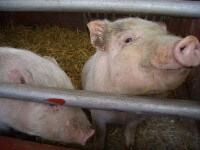
Because of a mild winter, the country’s burgeoning hog population has, well, porked up. The increase in hogs has led to a decrease in wholesale prices, but consumers have yet to benefit from discounted pork products at restaurants and supermarkets. Retailers have yet to lower prices and in the midst of a struggling economy, this is leading to less pork consumption.
As Marshall Eckblad reports in the Wall Street Journal:
[R]etailers are keeping prices higher, in large part because some anticipate wholesale prices eventually will rise, said Jim Robb, director of the Livestock Marketing Information Center in Denver, a cooperative that includes representatives from academia, the government and the meat trade.
Costco Wholesale Corp. (COST) spokesman Jeff Lyons said retailers like Costco are loath to lower prices until they are sure they can make up for the discounts with higher volumes. Costco has discounted some popular pork ribs, Mr. Lyons said, though has offset that by keeping prices of loins and chops high.
“The problem with deflation is your sales have to be really high to cover your expenses,” Mr. Lyons said. “We’re trying to keep everything moving, for the vendor and for ourselves.”
The COO of Tyson Foods is quoted saying, “High-priced bacon actually decreased consumption.” And yet all around I see bacon—from the Wendy’s Baconator to Morton’s Steakhouse Bacon-Loaded Cheeseburger (for the latter, the bacon is inside the burger). What would the world be like if retail prices actually dropped? Would we have bacon-flavored milkshake? Oh wait, we already do.
That quote – “High priced bacon actually decreased consumption.” – reminds me of those Best of the Web features. Fox Butterfield, call your office…